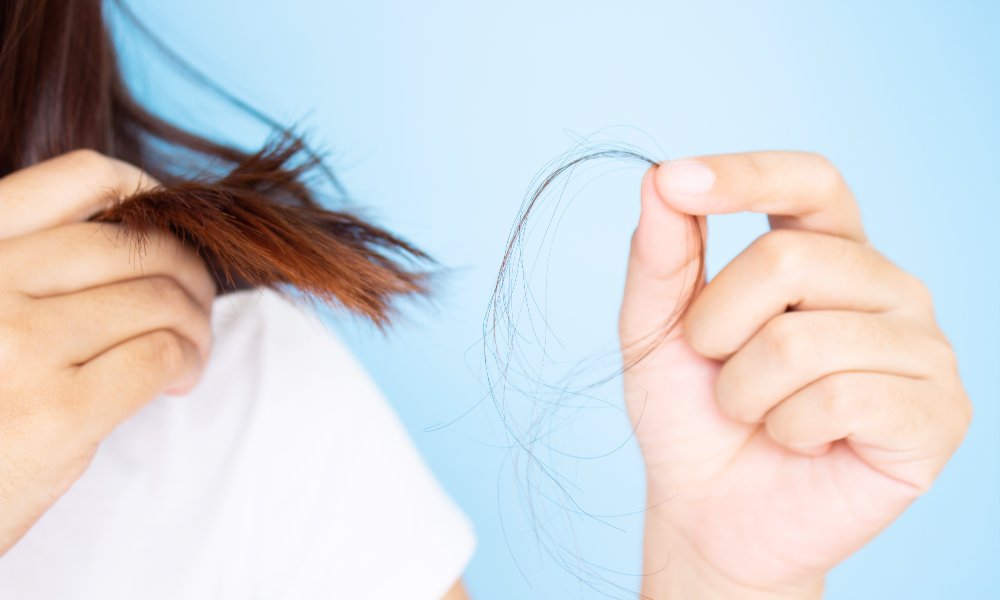
Women frequently worry about hair loss, which can be upsetting and affect one’s confidence. Hair loss can be caused by a variety of things, from lifestyle decisions to underlying medical issues. Regaine is a popular hair regrowth treatment that many individuals rely on to combat hair loss and promote healthier hair growth. In order to successfully solve the problem, it is imperative to understand the causes. The basic reasons for hair loss in women are examined in this article.
- Hormonal Disturbances: The state of your hormones has a big impact on the health of your hair. Hair loss may result from fluctuations in hormone levels, such as those that occur during menopause, postpartum, or pregnancy. Hormonal imbalances brought on by conditions like polycystic ovarian syndrome (PCOS) can also accelerate hair loss.
- Nutritional Deficiencies: Hair health may be impacted by inadequate consumption of vital nutrients. Hair loss can be caused by deficiencies in iron, zinc, biotin, vitamin D, and other vitamins and minerals. A range of nutrient-rich foods should be included in a balanced diet in order to maintain healthy hair.
- Factors related to stress and emotions include excessive stress, anxiety, and emotional upheaval. Stress alters the regular cycle of hair development, increasing shedding. Telogen effluvium is a condition that causes abrupt hair loss as a result of trauma or stress.
- Heat damage from over-styling, repeated chemical treatments, and severe hair care procedures can all harm hair follicles and cause hair loss. The hair shaft becomes more fragile and more prone to breaking when hair dryers, straighteners, curling irons, and chemical treatments are used excessively.
- Poor Scalp Health: Hair loss may be caused by an unhealthy scalp. The hair growth cycle can be thrown off by conditions like dandruff, fungal infections, or scalp psoriasis that induce irritation. For healthy hair, it is crucial to keep the scalp clean and well-fed.
- Family history and genetics: Genetic factors can affect hair loss. Androgenetic alopecia, also referred to as female pattern hair loss, is a hereditary disorder marked by gradual hair thinning. Women who have a history of hair loss in their families are more likely to deal with comparable problems.
- Medical disorders and Drugs: Some medical disorders and drugs can cause hair loss in women. Excessive hair shedding can be brought on by autoimmune diseases, thyroid disorders, and scalp conditions including alopecia areata. In addition, several drugs, especially those used to treat cancer, can cause temporary or permanent hair loss.
- Rapid weight reduction or excessive dieting: Shocking the body with rapid weight loss or extremely restrictive diets might result in hair loss. In such situations, the body places a higher priority on essential processes than hair development, which causes excessive shedding. To reduce hair fall, gradual and sustainable weight loss techniques are advised.
- Environmental Factors: The hair can become brittle and lose hair as a result of exposure to environmental toxins, too much sunlight, hard water, and harsh weather conditions. Damage can be reduced by shielding the hair from such things and maintaining good hair care practices.
A number of things, including hormone imbalances, nutritional deficiencies, stress, over-styling, scalp health problems, heredity, medical diseases, weight loss, and environmental factors, can contribute to hair loss in women. To choose the best course of therapy or preventive measures, the underlying cause must be determined. Minoxidil for women is an FDA-approved topical solution that is commonly used to stimulate hair regrowth and combat hair thinning in female individuals. A dermatologist or other healthcare provider can offer specialised advice on how to successfully handle hair fall issues. Additionally, leading a healthy lifestyle, eating a balanced diet, utilising stress-reduction tactics, and taking gentle care of your hair will help you keep your hair healthy and reduce hair loss.






